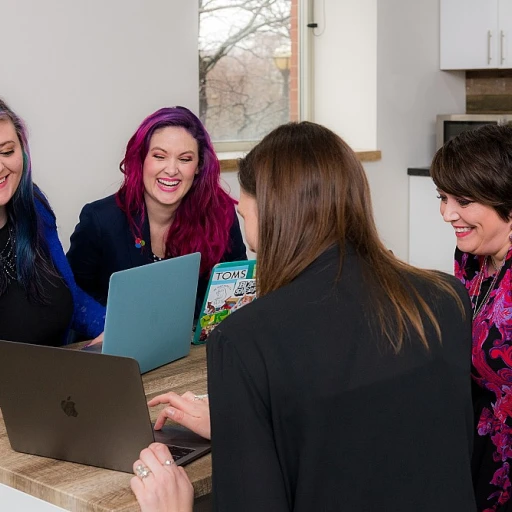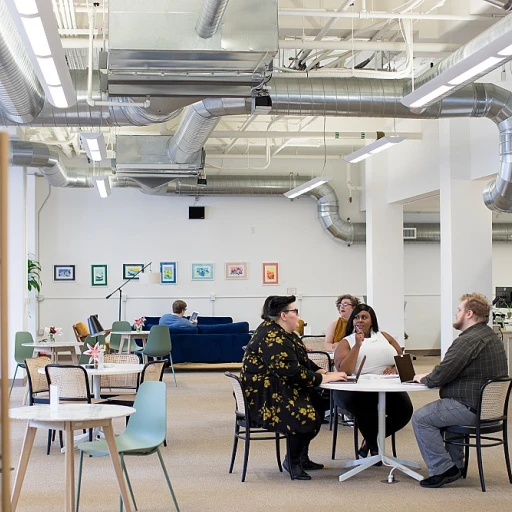Understanding the Core of Employee Experience
The Building Blocks of a Great Employee Experience
Creating a work environment that truly values and elevates the employee experience isn't just a nice-to-have – it's a must for any business aiming to thrive in the long term. At its heart, the employee experience is about how folks at your company feel on a daily basis during their work life. Thinking about how people feel may sound fluffy, but it’s impactful.
Humans are the core of the work process, not just cogs in a machine. When employees feel positive, engaged, and valued, they're more likely to become loyal employees who stick with the company, deliver great customer service, and ultimately drive customer satisfaction. It's this loyalty that ties directly to the employee experience.
Building an engaging workplace doesn't happen overnight. It requires work, patience, and understanding of what employees need and desire from their time at work. And it goes way beyond chill Friday dress codes or free coffee bars. It’s about crafting a positive workplace culture that values the workforce and encourages loyalty.
According to HR thought leader Josh Bersin, businesses that excel in employee experience practice open communication, offer meaningful work, and foster a sense of belonging and purpose. Cultivating such a work environment leads people to feel connected and committed to the company's success, and these connections translate into loyalty both from employees and customers.
This focus ensures satisfaction not only boosts the workforce's happiness but enhances customer loyalty. Learn more about how
unlocking the power of employee feedback can lead to a thriving workplace.
As you ponder the elements shaping an employee's time at your company, consider factors like work environment, employee engagement practices, work-life balance policies, and company culture as key influencers on employee satisfaction and loyalty. Understanding the core of employee experience can set your business apart with a reputation for being a great place to work and grow, which is also a direct path to improving customer experience and long-term business success.
The Connection Between Experience and Loyalty
Building Loyalty Through Positive Experiences
The connection between employee experience and loyalty is just like a conversation between two old friends. It's a bond that grows over time, rooted in trust, familiarity, and understanding. When employees have a positive experience at work, it doesn't just make their day a little brighter—it cultivates a deep-seated loyalty.
Positive employee experience isn't just about a paycheck. It encompasses the day-to-day culture, the relationships with peers, and the way they feel recognized for their efforts. A company that nurtures a strong, inclusive culture where employees feel valued often sees increased employee loyalty.
Loyal employees bring more to the table than just longevity. They are more engaged, productive, and committed to the company’s long-term success. When employees are treated well, they tend to return the favor with dedication and hard work. This not only boosts internal morale but also enhances customer service, impacting the overall customer experience and customer loyalty.
Creating a Positive Workplace Culture
So, how does a company cultivate an experience that fosters loyalty? It starts with creating a culture where all employees have a voice. Encouraging open communication and feedback can significantly improve employee engagement and satisfaction. When people feel heard, they feel more connected and loyal to the organization they work for.
Another vital component is work-life balance. Respecting employees' personal time and understanding their needs outside the workplace can significantly boost their loyalty. This holistic approach not only keeps them happy but also ensures they’re performing at their best.
Lastly, recognize their hard work. Whether it’s through loyalty programs, words of appreciation, or promotions, acknowledging employees' contributions fosters a feeling of being valued and respected.
To learn more about strategies to improve employee experience, check out
Effective Strategies for Success. Here, actionable insights can lead to transforming your workplace into one that's both satisfying and loyalty-inspiring.
Key Elements That Influence Employee Experience
The Building Blocks of a Positive Employee Experience
Creating a positive employee experience goes way beyond just having fancy perks in the office. It’s deeply tied to the emotional connection we have with our work and colleagues. Building these experiences requires understanding and acting on what influences employees' satisfaction and engagement.
A company’s culture is like its personality and plays a massive role in how employees feel at work. A positive workforce culture encourages open communication, supports innovative ideas, and acknowledges hard work, which often translates into loyal employees. This cultural backdrop is crucial for making employees feel valued and heard, ultimately boosting loyalty.
Work-life balance isn't just a trendy buzzword; it’s a cornerstone of employee satisfaction. Employers need to ensure that employees feel they can juggle work demands while having a fulfilling personal life. Happy employees are usually more motivated and better at offering quality customer service, thus contributing to increased customer loyalty.
Let's not forget the importance of recognition and rewards. Companies that celebrate achievements, whether big or small, foster a sense of belonging and motivate employees to stick around for the long term. Recognizing accomplishments makes workers feel appreciated, often resulting in a productive and engaging work environment.
Employee engagement is more than just employee happiness. It’s about getting employees emotionally invested in their work. When engagement is high, you can bet customer satisfaction will follow. Engaged employees are those who bring their best to work every day, making sure to support the organization’s goals and deliver the best customer experience.
An important piece of the puzzle is the ability to grow within the organization. Career development opportunities keep employees excited about their roles and future with the company. Providing clear paths for progression and learning not only nurtures employee loyalty but also adds skills that benefit the entire organization.
The fusion of these elements makes for an exceptional employee experience and lays the groundwork for loyalty. For those eager to learn how HR can really shape successful employee experiences, don't miss out on exploring more
here. This gives you a scoop into refining the organizational culture and improving employee engagement.
It’s all about creating a workplace where people feel they belong and are motivated and supported in their journey.
Strategies to Improve Employee Experience
Creating a Supportive Work Environment
Improving employee experience starts with fostering a supportive work environment. A workplace where employees feel valued and respected is a breeding ground for loyalty and engagement. When employees have a strong sense of belonging and pride in their company, they become loyal employees who are motivated to give their best. Positive employee experiences often translate into excellent customer service, which can lead to increased customer loyalty and satisfaction.
Enhancing Work-Life Balance
Companies should prioritize work-life balance by offering flexible work arrangements, such as remote work options or varied working hours. Such provisions allow employees to manage their personal lives effectively, leading to higher employee satisfaction. When employees feel that their work-life balance is respected, they're more likely to remain loyal to the organization.
Focusing on Employee Engagement
Building a culture of engagement goes a long way in improving employee experience. Engaging employees through open communication, regular feedback, and participation in decision-making processes can greatly enhance their commitment to the company. Employees who feel heard are more likely to develop a sense of responsibility and loyalty.
Investing in Professional Development
Organizations can improve employee experience by offering professional development opportunities. Training programs, workshops, and career advancement paths give employees the tools to grow and excel in their careers. When businesses invest in their employees' futures, it's a win-win situation that fosters a loyal workforce.
Implementing Recognition Programs
Recognizing employees' contributions and achievements can make them feel appreciated and motivated. Setting up recognition programs to celebrate achievements and milestones can positively impact employee engagement and workplace satisfaction. Acknowledging hard work helps build a culture of loyalty by reassuring employees that their efforts are visible and valued by the company.
By focusing on these areas, organizations can significantly enhance employee experience and loyalty. Ensuring that your employees are satisfied and engaged is not just good ethics but also a good business strategy that can lead to a thriving workforce.
Measuring Employee Experience and Loyalty
Evaluating Workplace Sentiment
Measuring how employees feel in their work environment is a game-changer when it comes to understanding loyalty. It's not just about numbers; it's about gauging satisfaction, engagement, and whether they feel people-oriented support. Regular feedback, whether through surveys or one-on-one meetings, paints a clearer picture of this sentiment.
Tapping into Loyalty Metrics
To truly grasp what makes employees loyal, we've got to dig into various metrics. Employee turnover rates, the frequency of promotions within the organization, and retention rates offer insights into how well the experience steers loyalty. These numbers are more than figures; they're stories of who stays loyal to the company culture and why.
Feedback Loops and Engagement
Creating an open channel where employees can voice their concerns or aspirations is vital. Feedback doesn't just stop at being heard; acting on it completes the loop. When employees see their ideas lead to real change, their engagement and loyalty skyrocket. Thus, utilizing platforms or regular meetings to foster open communication makes a significant impact.
The Interplay of Employee and Customer Experience
Interestingly, there's a reflection in how we manage customer satisfaction and employee satisfaction. Happy employees often translate to happy customers—it's a two-way street. The vibe in a business often seeps into customer service and loyalty, demonstrating how a positive employee experience can enhance customer experience.
Investing in Resources for Measurement
Any smart company knows when to invest in specialized tools or platforms for monitoring employee satisfaction and engagement levels. These tools provide valuable data analytics that help understand what adjustments are necessary for an improved employee experience. By investing in such resources, the organization reaps long-term benefits in terms of a loyal workforce.
In your journey to improve employee experience, remember this: measuring effectively and reacting with empathy and purpose sets the foundation for a happy work-life balance, leading to loyal employees and, ultimately, content customers.
Case Studies: Success Stories in Employee Experience
Real-Life Success Stories: Positive Employee Experience in Action
When we dive into real-world examples, the impact of nurturing a positive employee experience becomes crystal clear. Let's explore how some companies have turned their organizations into thriving workplaces and achieved high employee loyalty, driven by their commitment to an outstanding employee experience.
Google's Emphasis on Employee Satisfaction
Google, renowned for its unique company culture, prioritizes employee satisfaction by providing engaging work environments, competitive salaries, and benefits that promote work-life balance. By creating spaces where employees feel heard and valued, Google has cultivated immense employee loyalty, seeing them as integral to its innovation-driven success.
Southwest Airlines' Customer-Centric Culture
At Southwest Airlines, the mantra is: "Happy Employees Make Happy Customers." Here, employee engagement aligns intrinsically with customer service. The airline’s energetic culture offers transparent communication and empowerment leading to loyal employees who genuinely care about customer experience and satisfaction.
The Ritz-Carlton's Legendary Customer Service
At The Ritz-Carlton, their motto "We are ladies and gentlemen serving ladies and gentlemen" reflects their dedication to employee engagement and satisfaction. This hospitality giant empowers its workforce by fostering a culture of respect and trust, ultimately leading to outstanding customer service and glowing customer loyalty.
Zappos' Unique Approach to Employee Engagement
Zappos, an online shoe retailer, is recognized for its unique workplace culture. They focus not only on employee satisfaction but also on promoting a sense of community within the organization. By offering programs where employees can bond, Zappos ensures a happy and loyal workforce thriving in their individual roles and enhancing the overall company loyalty.
These companies demonstrate that by prioritizing employee experiences, businesses can improve not just company loyalty, but customer satisfaction as well. The first step is recognizing the integral role a positive work environment plays in driving success and fostering long-term loyal relationships both within and outside the workplace.








